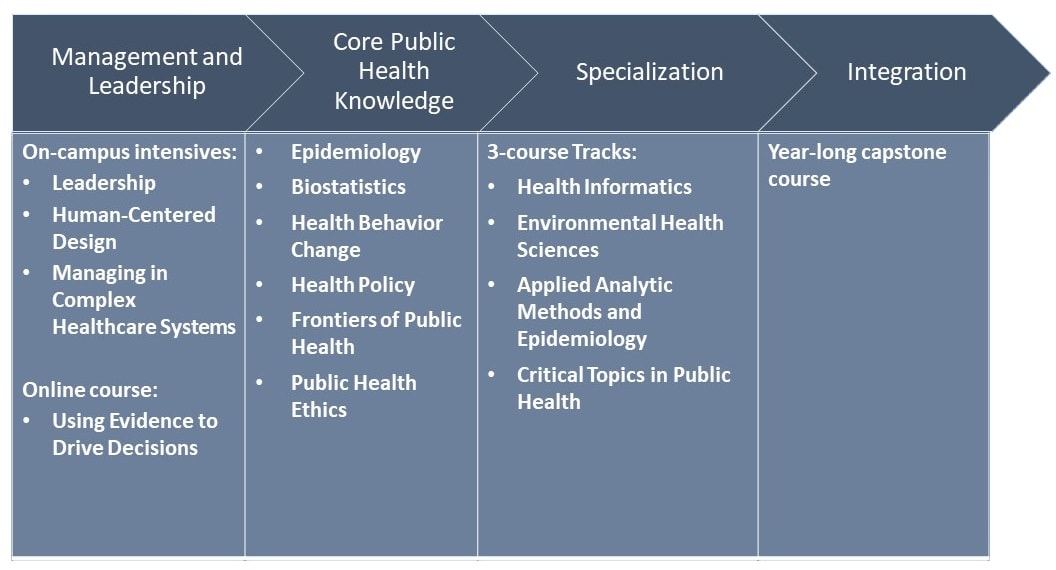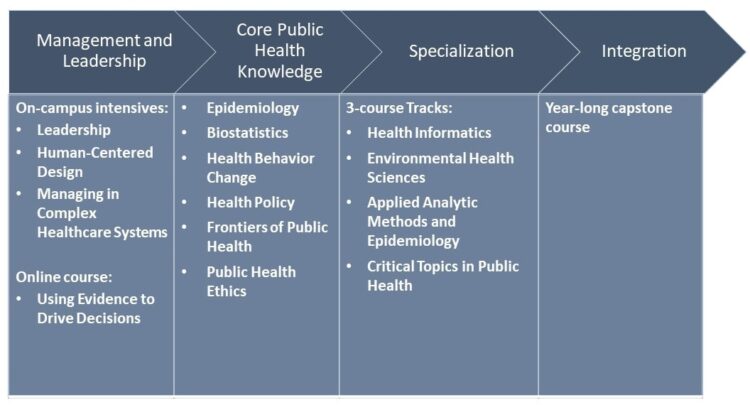
Introduction to Public Health Master’s Degree
A Master’s degree in Public Health (MPH) is a specialized graduate program that provides advanced knowledge and skills in public health theory, research, and practice. It equips individuals with the expertise to address complex health issues affecting populations, communities, and individuals.
MPH programs typically offer a broad range of concentrations and specializations, including epidemiology, biostatistics, environmental health, health policy and management, and social and behavioral health. These concentrations allow students to tailor their studies to specific areas of interest and career goals.
MPH Concentrations and Specializations
Epidemiology focuses on the distribution and determinants of health-related states and events in populations. It provides skills in disease surveillance, outbreak investigation, and data analysis.
Biostatistics involves the application of statistical methods to public health data. It equips students with the ability to design and analyze studies, interpret results, and communicate health information effectively.
Environmental Health addresses the relationship between the environment and human health. It covers topics such as air and water pollution, hazardous waste management, and occupational health.
Health Policy and Management prepares students for leadership roles in health organizations and policymaking. It provides knowledge of health care systems, financing, and management practices.
Social and Behavioral Health explores the social and behavioral factors that influence health outcomes. It addresses topics such as health disparities, health promotion, and disease prevention.
Curriculum and Coursework
Public Health Master’s programs provide a comprehensive curriculum designed to equip students with the knowledge and skills necessary to excel in the field. The core courses typically cover foundational concepts such as epidemiology, biostatistics, environmental health, and health policy.
Core Courses
These courses provide the essential knowledge base for public health professionals. They include:
- Epidemiology: The study of the distribution and determinants of health-related states and events in populations.
- Biostatistics: The application of statistical methods to public health data to analyze and interpret health trends and outcomes.
- Environmental Health: The study of the relationship between the environment and human health, including air pollution, water contamination, and climate change.
- Health Policy: The development and implementation of policies and programs to improve health outcomes at the local, national, and global levels.
Elective Options
In addition to core courses, students can choose from a wide range of elective options to specialize in a particular area of public health. These may include:
- Global Health: The study of health issues and challenges in developing countries.
- Maternal and Child Health: The study of health issues and interventions related to pregnant women, newborns, and children.
- Chronic Disease Prevention: The study of strategies to prevent and control chronic diseases such as heart disease, cancer, and diabetes.
- Health Promotion and Behavioral Change: The study of methods to promote healthy behaviors and reduce risk factors for disease.
Practicum and Internship Experiences
Practicum and internship experiences are an essential component of Public Health Master’s programs. These experiences provide students with hands-on training in the field and allow them to apply their knowledge and skills in real-world settings.
- Practicums: Supervised field experiences that typically involve working with community organizations or health departments on specific public health projects.
- Internships: Longer-term, full-time experiences that provide students with in-depth exposure to a specific area of public health.
Practicum and internship experiences are invaluable for students as they allow them to:
- Gain practical experience in public health settings.
- Develop professional skills such as communication, teamwork, and problem-solving.
- Network with professionals in the field.
- Explore career options and identify areas of interest.
Career Opportunities
With a Public Health Master’s degree, you open doors to a wide range of rewarding career paths in various fields. Graduates can leverage their specialized knowledge and skills in areas such as health policy, epidemiology, biostatistics, environmental health, and more.
Healthcare Management
Healthcare managers oversee the operations of healthcare facilities, ensuring efficient and effective delivery of medical services. They may work in hospitals, clinics, long-term care facilities, or health insurance companies. Responsibilities include budget management, staff supervision, quality assurance, and strategic planning. The median annual salary for healthcare managers is around $100,000.
Epidemiology
Epidemiologists investigate the distribution and determinants of health-related states and events in populations. They conduct research to identify risk factors, develop prevention strategies, and evaluate the effectiveness of public health interventions. Epidemiologists work in government agencies, research institutions, and non-profit organizations. The median annual salary for epidemiologists is approximately $80,000.
Biostatistics
Biostatisticians apply statistical methods to analyze health data and draw meaningful conclusions. They collaborate with researchers, healthcare professionals, and policymakers to design studies, interpret results, and inform decision-making. Biostatisticians find employment in academia, pharmaceutical companies, government agencies, and research institutions. The median annual salary for biostatisticians is close to $90,000.
Environmental Health
Environmental health specialists work to protect human health from environmental hazards. They monitor air and water quality, conduct risk assessments, and develop policies to reduce environmental exposures. Environmental health specialists work in government agencies, consulting firms, and non-profit organizations. The median annual salary for environmental health specialists is approximately $75,000.
Admissions Requirements
Admission to Public Health Master’s programs is competitive, and applicants should meet specific requirements. A strong academic record, relevant experience, and a well-crafted personal statement are essential components of a successful application.
Academic Record
Most programs require a bachelor’s degree in a related field, such as public health, health sciences, or social sciences. A strong GPA, typically 3.0 or higher, demonstrates academic excellence and readiness for graduate-level work.
Relevant Experience
Experience in public health or a related field can significantly enhance an application. This could include internships, volunteer work, or research projects that demonstrate practical knowledge and skills.
Personal Statement
The personal statement is an opportunity to articulate your motivations, career goals, and why you are a suitable candidate for the program. It should be well-written, concise, and tailored to the specific program you are applying to.
Program Selection
Selecting the right Public Health Master’s program is crucial to your career aspirations and personal growth. Consider the following factors to make an informed decision:
Location
– Geographic location plays a significant role in the accessibility and relevance of the program to your career goals and personal preferences.
– Proximity to public health organizations, research centers, and healthcare facilities can enhance your learning experience and networking opportunities.
Reputation
– The reputation of the university and its public health program is a valuable indicator of the quality of education and research you can expect.
– Look for programs accredited by reputable organizations, such as the Council on Education for Public Health (CEPH), to ensure the curriculum meets industry standards.
Curriculum
– Evaluate the program’s curriculum to ensure it aligns with your career interests and goals.
– Consider the balance of core public health courses, specialized electives, and research opportunities.
– Inquire about the availability of internships, practicums, or field experiences to enhance your practical skills.
Program Comparison Table
| Program | Location | Reputation | Curriculum |
|—|—|—|—|
| Program A | Boston, MA | Top 10 | Strong focus on global health |
| Program B | San Francisco, CA | Top 20 | Emphasis on environmental health |
| Program C | New York, NY | Top 30 | Renowned for its epidemiology program |
Financial Considerations

Obtaining a Public Health Master’s degree requires careful financial planning. Costs vary depending on factors such as the institution, program length, and living expenses. Tuition fees, books, and materials constitute the primary expenses.
Funding Options
Scholarships, grants, and loans are available to assist students with financial needs. Scholarships and grants are awarded based on merit or financial hardship, while loans require repayment with interest. Exploring these options can significantly reduce the financial burden associated with pursuing a Public Health Master’s degree.





